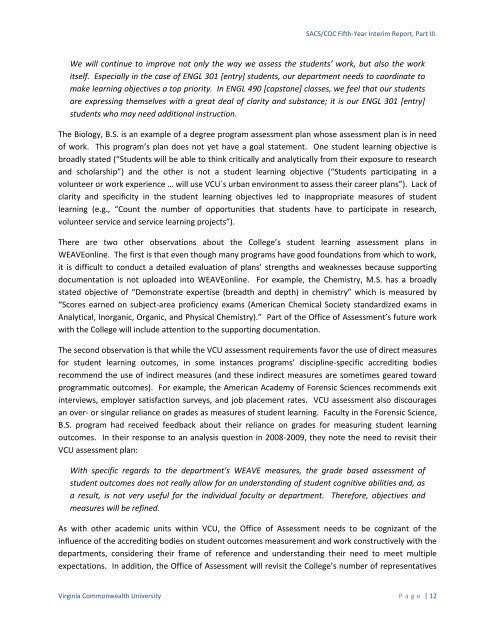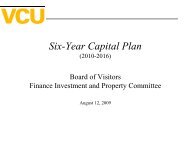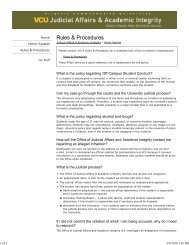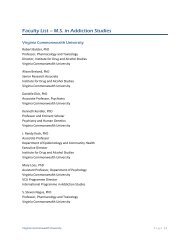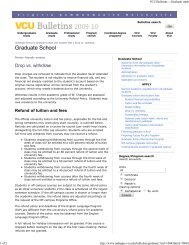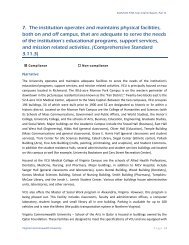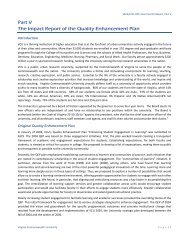4. The institution identifies expected outcomes, assesses the extent ...
4. The institution identifies expected outcomes, assesses the extent ...
4. The institution identifies expected outcomes, assesses the extent ...
Create successful ePaper yourself
Turn your PDF publications into a flip-book with our unique Google optimized e-Paper software.
SACS/COC Fifth-Year Interim Report, Part III.<br />
We will continue to improve not only <strong>the</strong> way we assess <strong>the</strong> students’ work, but also <strong>the</strong> work<br />
itself. Especially in <strong>the</strong> case of ENGL 301 [entry] students, our department needs to coordinate to<br />
make learning objectives a top priority. In ENGL 490 [capstone] classes, we feel that our students<br />
are expressing <strong>the</strong>mselves with a great deal of clarity and substance; it is our ENGL 301 [entry]<br />
students who may need additional instruction.<br />
<strong>The</strong> Biology, B.S. is an example of a degree program assessment plan whose assessment plan is in need<br />
of work. This program’s plan does not yet have a goal statement. One student learning objective is<br />
broadly stated (“Students will be able to think critically and analytically from <strong>the</strong>ir exposure to research<br />
and scholarship”) and <strong>the</strong> o<strong>the</strong>r is not a student learning objective (“Students participating in a<br />
volunteer or work experience … will use VCU`s urban environment to assess <strong>the</strong>ir career plans”). Lack of<br />
clarity and specificity in <strong>the</strong> student learning objectives led to inappropriate measures of student<br />
learning (e.g., “Count <strong>the</strong> number of opportunities that students have to participate in research,<br />
volunteer service and service learning projects”).<br />
<strong>The</strong>re are two o<strong>the</strong>r observations about <strong>the</strong> College’s student learning assessment plans in<br />
WEAVEonline. <strong>The</strong> first is that even though many programs have good foundations from which to work,<br />
it is difficult to conduct a detailed evaluation of plans’ strengths and weaknesses because supporting<br />
documentation is not uploaded into WEAVEonline. For example, <strong>the</strong> Chemistry, M.S. has a broadly<br />
stated objective of “Demonstrate expertise (breadth and depth) in chemistry” which is measured by<br />
“Scores earned on subject-area proficiency exams (American Chemical Society standardized exams in<br />
Analytical, Inorganic, Organic, and Physical Chemistry).” Part of <strong>the</strong> Office of Assessment’s future work<br />
with <strong>the</strong> College will include attention to <strong>the</strong> supporting documentation.<br />
<strong>The</strong> second observation is that while <strong>the</strong> VCU assessment requirements favor <strong>the</strong> use of direct measures<br />
for student learning <strong>outcomes</strong>, in some instances programs’ discipline-specific accrediting bodies<br />
recommend <strong>the</strong> use of indirect measures (and <strong>the</strong>se indirect measures are sometimes geared toward<br />
programmatic <strong>outcomes</strong>). For example, <strong>the</strong> American Academy of Forensic Sciences recommends exit<br />
interviews, employer satisfaction surveys, and job placement rates. VCU assessment also discourages<br />
an over- or singular reliance on grades as measures of student learning. Faculty in <strong>the</strong> Forensic Science,<br />
B.S. program had received feedback about <strong>the</strong>ir reliance on grades for measuring student learning<br />
<strong>outcomes</strong>. In <strong>the</strong>ir response to an analysis question in 2008-2009, <strong>the</strong>y note <strong>the</strong> need to revisit <strong>the</strong>ir<br />
VCU assessment plan:<br />
With specific regards to <strong>the</strong> department’s WEAVE measures, <strong>the</strong> grade based assessment of<br />
student <strong>outcomes</strong> does not really allow for an understanding of student cognitive abilities and, as<br />
a result, is not very useful for <strong>the</strong> individual faculty or department. <strong>The</strong>refore, objectives and<br />
measures will be refined.<br />
As with o<strong>the</strong>r academic units within VCU, <strong>the</strong> Office of Assessment needs to be cognizant of <strong>the</strong><br />
influence of <strong>the</strong> accrediting bodies on student <strong>outcomes</strong> measurement and work constructively with <strong>the</strong><br />
departments, considering <strong>the</strong>ir frame of reference and understanding <strong>the</strong>ir need to meet multiple<br />
expectations. In addition, <strong>the</strong> Office of Assessment will revisit <strong>the</strong> College’s number of representatives<br />
Virginia Commonwealth University P a g e | 12


